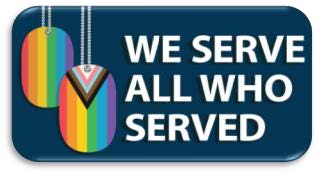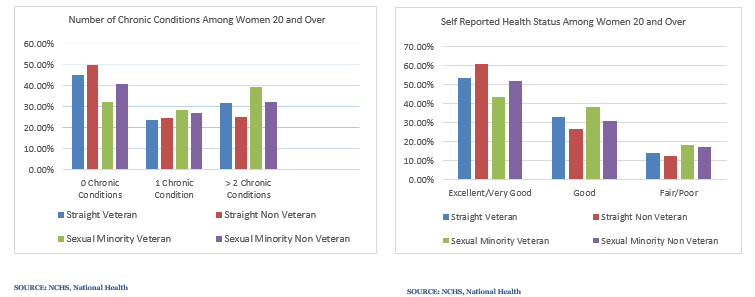Attention A T users. To access the menus on this page please perform the following steps.
1. Please switch auto forms mode to off.
2. Hit enter to expand a main menu option (Health, Benefits, etc).
3. To enter and activate the submenu links, hit the down arrow.
You will now be able to tab or arrow up or down through the submenu options to access/activate the submenu links.
Locator
Contact
Search
Health Disparities Among LGBT Women Veterans
|
 |
Download PDF
INTRODUCTION
The Veterans Health Administration (VHA) serves a Veteran population that is increasingly racially and ethnically diverse. Equitable access to high-quality care for all Veterans is a major tenet of the VHA mission. The Office of Health Equity (OHE) champions the elimination of health disparities and achieving health equity for all Veterans, including Veterans with LGBT and related identities. LGBT stands for “Lesbian, Gay, Bisexual, Transgender.” People may use various terms to signify their sexual orientation or gender identity and they decide the term/s that best suits them.
HEALTH DISPARITIES
Recent CDC data shows sexual minority women Veterans have more chronic health conditions and report worse health compared to straight women Veterans and non-Veterans. They are also more likely to be current smokers, engage in excessive drinking, feel sad or lonely. Additional research finds sexual minority women Veterans are at higher risk of military sexual assault and current intimate partner violence. Further, ethnic and sexual minority women Veterans experience higher levels of distress than white sexual minority women.
Talk to your healthcare provider about these risks.
REDUCING DISPARITIES AND IMPROVING ACCESS
Barriers to receiving culturally competent healthcare can contribute to worse health outcomes for LGBT individuals. A provider’s knowledge of a patient’s LGBT status is essential to providing appropriate prevention screening and care.
Provider-focused education and inclusive facility policies are beginning to raise awareness about the unique needs and healthcare disparities facing LGBT Veterans. There is growing support that these methods have contributed to improved LGBT Veteran experience with VHA services (Kauth, et al., 2018). Beyond inclusive healthcare policies and provider training, patient health education is a method for encouraging positive health behavior choices.
LGBT SUPPORT IN THE VA
VHA has made enormous strides to address the health needs of vulnerable groups, including women and LGB and transgender veterans. As of March 2016, each VA facility has a local LGBT Veteran Care Coordinator (VCC) who is appointed by their facility leadership. The VCC is responsible for promoting best practices for serving LGBT Veterans and connecting LGBT Veterans to services.
Another resource is the creation of LGB veteran support groups that recognize the individual’s unique identity as both LGB and veteran. VA Palo Alto’s Living Out Loud/Laughing Out Loud support group for LGB and transgender veterans is one example of this type of LGBT support provided by the VA. The group provides members with an opportunity to receive social support from peers, as well as explores a variety of topics, such as isolation, mental health, and family issues. The presence of such groups could help make VHA a provider of choice for LGB veterans, as well as increase sensitivity to and visibility of these veterans within VHA medical centers. There are now over 20 VA LGBT Support Groups.
- The LGBT Veteran Care Coordinator (LGBT VCC) can also help you get the care you need. Contact the LGBT VCC at your nearest facility: https://www.patientcare.va.gov/LGBT/VAFacilities.asp
- For additional information about the care VA offers to LGBT Veterans, visit: https://www.patientcare.va.gov/LGBT/index.asp
For more information about the Office of Health Equity visit: https://www.va.gov/healthequity/
For additional OHE fact sheets and information briefs visit: https://www.va.gov/HEALTHEQUITY/Publications_and_Research.asp
REFERENCES
Lehavot, K., Beckman, K. L., Chen, J. A., Simpson, T. L., & Williams, E. C. (2019). Race/ethnicity and sexual orientation disparities in mental health, sexism, and social support among women veterans. Psychology of Sexual Orientation and Gender Diversity, 6(3), 347–358. [PMCID: PMC6703561]
Blosnich, J., Foynes, M.M., & Shipherd, J.C. (2013). Health disparities among sexual minority women Veterans. Journal of Women’s Health, 22(7), 631-636. [PMCID: PMC3761433]
Lehavot K, Simpson TL. Incorporating lesbian and bisexual women into women veterans' health priorities. J Gen Intern Med. 2013;28 Suppl 2(Suppl 2):S609-S614. doi:10.1007/s11606-012-2291-2 [PMCID: PMC3695269]
VA Palo Alto Health Care System. Fabulous, Fearless and Full of Pride. Veterans Health Administration. https://www.paloalto.va.gov/features/fullofpride.asp


































